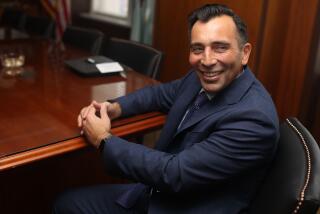Little Light Shed on Bush Judicial Pick
WASHINGTON — Washington attorney Miguel Estrada, whose nomination to the U.S. Court of Appeals has split Latino groups, assured Senate Democrats in a surprisingly low-key hearing Thursday that his personal and political views will not affect how he decides cases as a judge.
“Although we all have views on a number of subjects from A to Z, the first duty of a judge is to put all of that aside,” said Estrada, President Bush’s choice for a seat on the evenly divided appeals court in Washington.
“I’m not worried in the least that anybody could detect any bias or lack of skill in my legal work,” he added.
Estrada’s nomination has drawn intense interest because, if confirmed, he could be in line to be the first Latino chosen for the Supreme Court.
But Thursday’s hearing added little to the little that is already known about Estrada’s legal views.
Unlike most other nominees to the higher courts, Estrada has virtually no written record--as a judge, law professor or an advocate on public issues.
Two Democrats, Sens. Charles E. Schumer of New York and Patrick J. Leahy of Vermont, insisted that the Judiciary Committee needs to see the memos Estrada wrote while working as a lawyer in the Justice Department’s office of solicitor general.
Department officials refused to release the memos, saying that internal legal advice is confidential.
“I’m more than happy to convey your request,” Estrada replied, but he added the decision rests with the Justice Department, not him.
Estrada, who turned 41 Wednesday, was born in Honduras, the son of a lawyer. He came to New York as a teenager and later excelled at Columbia College and Harvard Law School.
After graduation, he clerked for Supreme Court Justice Anthony M. Kennedy and served five years in the solicitor general’s office, which represents the government in the high court. He began under the first Bush administration’s Solicitor General Kenneth W. Starr and stayed on during the Clinton administration.
Since leaving government, he has worked as a lawyer in the Washington office of the Los Angeles law firm of Gibson, Dunn & Crutcher. There, he worked with the team of Republican lawyers who fought to stop the Florida recount in what became the Bush vs. Gore case.
Soon after taking office, Bush nominated Estrada to the appeals court in Washington. Estrada has won the support of some Latino groups and is opposed by others.
The League of United Latin American Citizens, the Latino Coalition and the U.S. Hispanic Chamber of Commerce endorsed him. The Congressional Hispanic Caucus and Puerto Rican Legal Defense Fund opposed him, and the Mexican American Legal Defense and Educational Fund said it had “grave concerns” about his record.
Friends who have worked with him say Estrada is brilliant and has a penetrating legal mind. His admirers include former Clinton administration lawyers Ronald Klain and Seth Waxman, a former solicitor general.
Detractors say Estrada can be acerbic and arrogant in private, and they believe he will be a rigid conservative if put on the bench.
Estrada admitted Thursday he had described as “boneheaded” a question from a Puerto Rican lawyer during a meeting with attorneys from the Puerto Rican Legal Defense Fund.
“By and large, it was a cordial conversation,” Estrada said. But when one of them suggested he was “not sufficiently Hispanic, I found those comments offensive and boneheaded.”
The committee has not said when it will vote on Estrada.
Bush has made it clear that he would like to appoint a Latino to the high court, a move that could give the GOP a big political boost. Speaking at a Republican fund-raiser Wednesday, the president lauded Estrada as a “fine man” and an “excellent lawyer.”
Democrats hold a slim 10-9 majority on the Senate Judiciary Committee, and while they have approved 78 of Bush’s judicial nominees, they have rejected two: Mississippi Judge Charles W. Pickering and Texas Supreme Court Justice Priscilla Owen.
“The Democratic Senate has acted far faster and far more fairly on President Bush’s judicial nominees than the Republicans did with President Clinton’s nominees,” Leahy said Thursday.
The post Estrada hopes to fill is vacant because Republicans blocked action on two Clinton picks for the court: Washington attorney Allen Snyder and Harvard law professor Elena Kagan.
More to Read
Get the L.A. Times Politics newsletter
Deeply reported insights into legislation, politics and policy from Sacramento, Washington and beyond. In your inbox three times per week.
You may occasionally receive promotional content from the Los Angeles Times.











